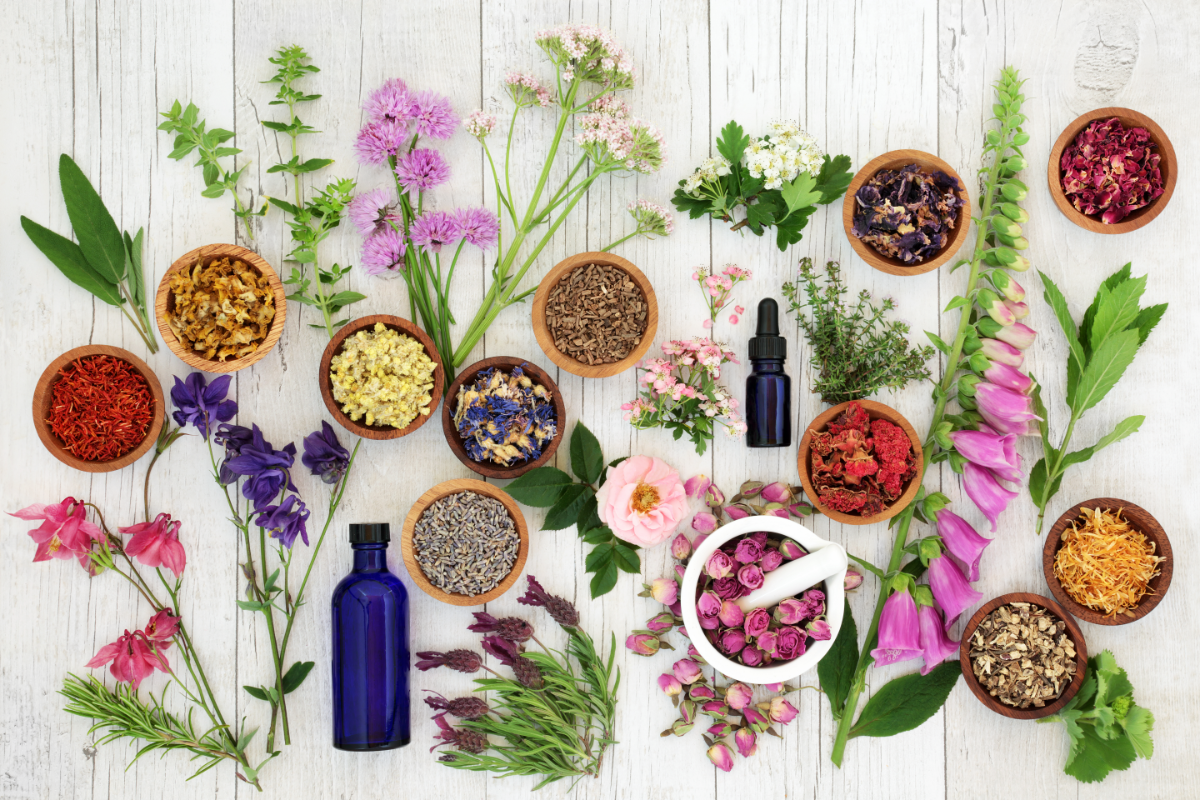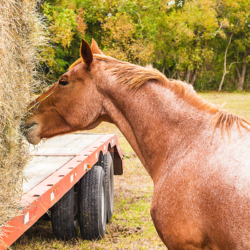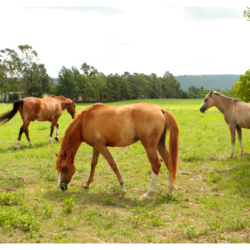In the management of tendonitis, it is crucial to support recovery with proper care and nutrition. Herbal supplements to promote healing can be added to the horse’s diet. For example, clay poultices are often used to aid healing and reduce inflammation caused by tendonitis.
Nutritherapy
Key nutrients such as vitamins and minerals are essential to support the healing process and maintain healthy connective tissue. Weight management is also important to avoid excessive weight gain, which could place additional stress on the healing tissues.
The following nutritional supplements are recommended:
- Amino acids (lysine, methionine, threonine): These amino acids are essential for protein synthesis. Lysine is crucial for collagen formation. Methionine is involved in the synthesis of cysteine and taurine, two other amino acids important for the health of connective tissue. Threonine is necessary for the production of glycine and serine, which are involved in tissue repair.
- Vitamin C: Vitamin C is a powerful antioxidant. It plays a crucial role in collagen synthesis. It is necessary for the hydroxylation of proline and lysine residues in collagen, which is essential for the stability and strength of collagen fibres.
- MSM (Methylsulfonylmethane): MSM is a bioavailable source of sulphur, an important mineral for the formation of connective tissue. It contributes to the production of collagen and keratin and helps reduce inflammation and pain, accelerating recovery from tendon injuries.
- Omega-3 fatty acids: Omega-3 fatty acids, such as DHA and EPA, are known for their anti-inflammatory properties. They help regulate inflammatory processes in the body, reducing inflammation during the recovery period. They also play a role in cell membrane fluidity and cell communication.
Ekyflex Tendon Evo is a supplement providing the essential elements for the creation of quality collagen. Nutrition plays a crucial role in supporting horses suffering from tendon injuries.
Oral phytotherapy for tendonitis
Plants such as horsetail, bamboo, boswellia, white willow and meadowsweet are beneficial to horses’ health. Here are their detailed benefits:
- Horsetail (Equisetum arvense): Rich in plant silica, it is beneficial for ligament, tendon and bone tissue. It stimulates collagen synthesis, promotes the regeneration of connective tissue and contributes to bone strength.
- Bamboo Tabashir (Bambusa arundinacea): Rich in silicon, it stimulates collagen synthesis and promotes the reconstitution of tissues destroyed by tendon or joint injuries. It improves calcium fixation and accelerates the formation of bone bridges in the event of fractures.
- Boswellia serrata: Known for its anti-inflammatory properties, Boswellia resin inhibits the production of certain enzymes involved in inflammatory processes, thereby reducing pain and inflammation in joints and tendons.
- White willow (Salix alba) and meadowsweet (Filipendula ulmaria): Rich in salicylated derivatives, precursors of aspirin, they have anti-inflammatory and analgesic properties, reducing pain and inflammation in joints and tendons.
- Harpagophytum procumbens (Devil’s Claw): Protects joint capsules, ligaments and tendons from inflammatory processes. Often used to relieve joint pain and tendonitis.
- Nettle (Urtica dioica): Rich in minerals and trace elements (iron, silicon, calcium), it activates the regeneration of bone tissue and tendon and ligament fibres. It also promotes blood circulation and detoxification of the body.
- Pilosella (Hieracium pilosella): Known for its diuretic properties, it helps to eliminate oedema and congestion of the limbs. It also helps wounds to heal.
- Red vine (Vitis vinifera): Activates blood circulation, accelerating the regeneration and healing of damaged fibres. It has venotonic and anti-inflammatory properties.
Skincare for tendonitis
Several natural products can be used for their therapeutic properties when applied to the skin.
Clays
- Red clay: Rich in iron oxide, red clay supports blood circulation and has a purifying action. It is particularly useful for its decongestant properties. It is often used in poultices to reduce inflammation and promote tissue healing.
- Green clay: With its powerful absorbent and adsorbent properties,green clay is effective in reducing oedema. It also prevents tendon congestion. It also helps to decongest horses’ limbs by absorbing toxins and impurities.
Oily macerates
- Calendula (Calendula officinalis) oily macerate: This macerate is recognised for its softening and nourishing properties. It promotes the natural regeneration of the epidermis and has calming properties. This makes it an excellent choice for soothing and repairing damaged tissue.
- Arnica (Arnica montana) oily macerate: Used topically, it helps soothe muscle pain and inflammation thanks to its anti-inflammatory and analgesic properties. Arnica is often used to treat bruises, sprains and joint pain.
Essential oils
- Peppermint (Mentha piperita): Has refreshing and soothing properties. Ideal for relieving pain and speeding recovery after exercise, thanks to its high menthol content. Menthol induces a cooling sensation on the skin and reduces muscular discomfort.
- Thyme (Thymus vulgaris): Supports blood circulation and has soothing properties. Used for its anti-infectious and stimulating properties, it helps to improve circulation in damaged tissue and reduce local inflammation.
- Rosemary (Rosmarinus officinalis): Decongestant and relaxing, it improves blood circulation and tissue regeneration. Its anti-inflammatory and antioxidant properties help to reduce pain and swelling, promoting the healing of damaged tissue.
- Eucalyptus (Eucalyptus globulus): Known for its decongestant and cooling properties, it helps to activate lymphatic circulation and soothe muscle and joint pain. Effective for reducing swelling and improving mobility after injury.
- Wintergreen (Gaultheria procumbens): Rich in methyl salicylate, it has a soothing action and helps keep joints and muscles comfortable. Particularly effective in relieving muscle and joint pain and inflammation.





